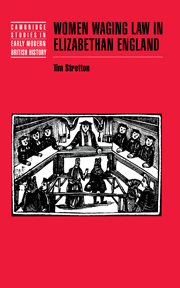Book contents
- Frontmatter
- Contents
- Lists of maps and figures
- List of tables
- Preface
- Notes on the text
- Abbreviations
- 1 Introduction
- 2 Women, legal rights and law courts
- 3 Female litigants and the culture of litigation
- 4 The Court of Requests
- 5 Unmarried women and widows
- 6 Married women in Requests
- 7 Freebench, custom and equity
- 8 Pleading strategies in Requests
- 9 Women waging law
- Glossary
- Bibliography
- Index
- Cambridge Studies in Early Modern British History
1 - Introduction
Published online by Cambridge University Press: 11 November 2009
- Frontmatter
- Contents
- Lists of maps and figures
- List of tables
- Preface
- Notes on the text
- Abbreviations
- 1 Introduction
- 2 Women, legal rights and law courts
- 3 Female litigants and the culture of litigation
- 4 The Court of Requests
- 5 Unmarried women and widows
- 6 Married women in Requests
- 7 Freebench, custom and equity
- 8 Pleading strategies in Requests
- 9 Women waging law
- Glossary
- Bibliography
- Index
- Cambridge Studies in Early Modern British History
Summary
The position of women is one thing in theory, another in legal position, yet another in everyday life
Eileen Power, Medieval WomenThe law is a powerful determinant of status in any society. Laws establish the age of legal responsibility, defining the point at which children become adults. They permit individuals to act in certain ways and prohibit them from acting in others and they set out the differing rights and responsibilities of women and men. Taken together they provide a unique and highly visible embodiment of the values, beliefs and prejudices of a given community. Feminist historians and campaigners for women's rights have therefore looked to legal codes and legal commentaries to learn the history of inequality between the sexes, and to consider directions for future reform. Theoretical notions about women's legal position underpin many histories of women, however surprisingly little is known about the full complexity of different women's (and indeed men's) relationships with the law prior to the modern period. For while statutes and commentaries are revealing of attitudes to women and shifts in women's legal status, they say little about the effect that laws had on women's lives. This study seeks to address this imbalance, taking as its subject not women and the law, but women and litigation, focusing predominantly (but not exclusively) on Elizabethan England. Building on the work of other historians who have analysed the law in practice, it seeks to raise, and where possible to answer, a number of questions about the use English women made of legal institutions in the sixteenth and early seventeenth centuries.
- Type
- Chapter
- Information
- Women Waging Law in Elizabethan England , pp. 1 - 20Publisher: Cambridge University PressPrint publication year: 1998



